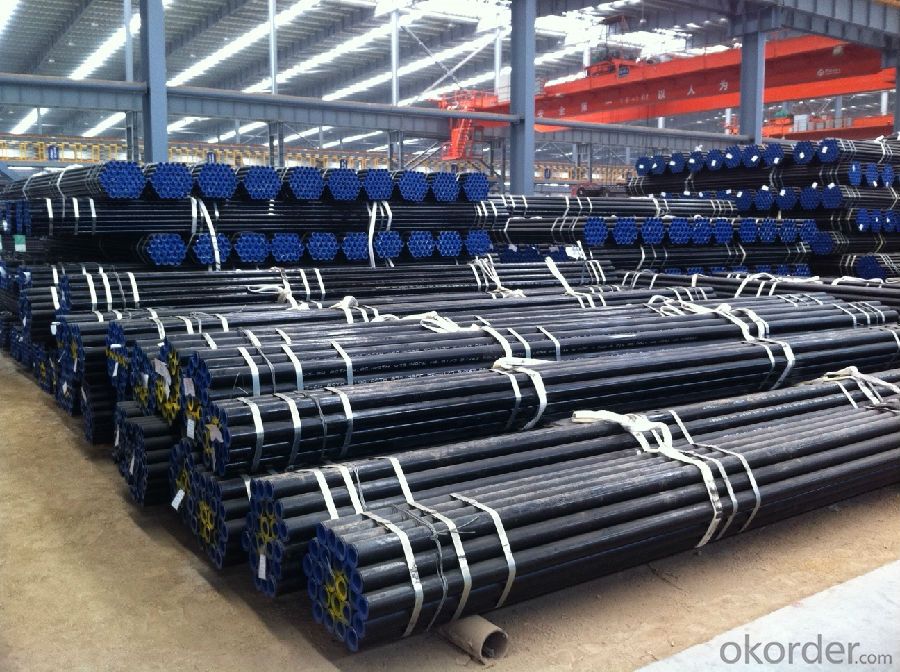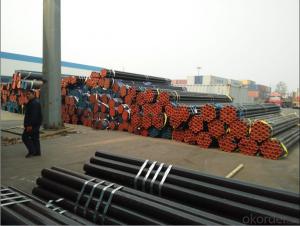Carbon Steel Seamless Steel Pipe 2‘’-24‘’ Best Quality
- Loading Port:
- Tianjin
- Payment Terms:
- TT OR LC
- Min Order Qty:
- 25 m.t.
- Supply Capability:
- 10000 m.t./month
OKorder Service Pledge
OKorder Financial Service
You Might Also Like
1. Structure of Carbon Steel Seamless Steel Pipe 2‘’-24‘’ Best Quality Good Price :
Seamless pipe is formed by drawing a solid billet over a piercing rod to create the hollow shell. As the manufacturing process does not include any welding, seamless pipes are perceived to be stronger and more reliable. Historically seamless pipe was regarded as withstanding pressure better than other types, and was often more easily available than welded pipe. The purpose is to conveying gas, water, oil and others. We provide all the sizes with competitive price and good quality.
2、Main Features of the Carbon Steel Seamless Steel Pipe 2‘’-24‘’ Best Quality Good Price:
• High manufacturing accuracy
• High strength
• Small inertia resistance
• Strong heat dissipation ability
• Good visual effect
• Reasonable price
3、Carbon Steel Seamless Steel Pipe 2‘’-24‘’ Best Quality Specification:
Standard | GB, DIN, ASTM ASTM A106-2006, ASTM A53-2007 |
Grade | 10#-45#, 16Mn 10#, 20#, 45#, 16Mn |
Thickness | 8 - 33 mm |
Section Shape | Round |
Outer Diameter | 133 - 219 mm |
Place of Origin | Shandong, China (Mainland) |
Secondary Or Not | Non-secondary |
Application | Hydraulic Pipe |
Technique | Cold Drawn |
Certification | API |
Surface Treatment | factory state or painted black |
Special Pipe | API Pipe |
Alloy Or Not | Non-alloy |
Length | 5-12M |
Outer Diameter | 21.3-610mm |
Grade | 20#, 45#, Q345, API J55, API K55, API L80, API N80, API P110, A53B |
Standard | ASME, ASTM |
1) Material:20#(ASTM A 106/A53 GRB.API5LGRB,GB),45#,16Mn,10#.
2) Specification range:OD:21.3-610mm,WT:6-70mm,length:6-12m or according to the requirement of clients.
3) Excutive standards:GB,ASME API5L.ASTM A 106/A53,Despite of the above standards,we can also supply seamless steel pipe with standard of DIN,JIS,and so on,and also develop new products according to the requirements of our clients!
4) Surface:black lacquered,varnish coating or galvanized.
5) Ends:Beveled or square cut,plastic capped,painted.
6) Packing:bundles wrapped with strong steel strip,seaworthy packing.
4、Packaging & Delivery
Packaging Details: | seaworthy package,bundles wrapped with strong steel strip |
Delivery Detail: | 15-30days after received 30%TT |
5、FAQ of Carbon Steel Seamless Steel Pipe 2‘’-24‘’ Best Quality:
①How is the quality of your products?
Our products are manufactured strictly according to national and internaional standard, and we take a test
on every pipe before delivered out. If you want see our quality certifications and all kinds of testing report, please just ask us for it.
Guaranteed: If products’ quality don’t accord to discription as we give or the promise before you place order, we promise 100% refund.
②How about price?
Yes, we are factory and be able to give you lowest price below market one, and we have a policy that “ for saving time and absolutely honest business attitude, we quote as lowest as possible for any customer, and discount can be given according to quantity”,if you like bargain and factory price is not low enough as you think, just don’t waste your time.Please trust the quotation we would give you, it is professional one.
③Why should you chose us?
Chose happens because of quality, then price, We can give you both.Additionally, we can also offer professional products inquiry, products knowledge train(for agents), smooth goods delivery, exellent customer solution proposals.Our service formula: good quality+good price+good service=customer’s trust
SGS test is available, customer inspection before shipping is welcome, third party inspection is no problem.
6、Carbon Steel Seamless Steel Pipe 2‘’-24‘’ Best Quality Images:

- Q:Can steel pipes be used for heat exchangers?
- Yes, steel pipes can be used for heat exchangers. Steel pipes are commonly used in heat exchangers due to their strength, durability, and excellent thermal conductivity properties. They are capable of withstanding high temperatures and pressures, making them suitable for various industrial applications.
- Q:Are steel pipes suitable for chemical processing plants?
- Yes, steel pipes are suitable for chemical processing plants. Steel pipes have excellent strength and durability, making them resistant to corrosion and able to withstand high pressure and temperature conditions common in chemical processing plants. Additionally, steel pipes can be easily welded, offering flexibility in design and installation.
- Q:Can steel pipes be used for hydropower generation?
- Yes, steel pipes can be used for hydropower generation. Steel pipes are often used in the construction of hydroelectric power plants to transport water from a higher elevation to lower areas, where the water's kinetic energy is converted into mechanical energy to generate electricity. The durability and strength of steel pipes make them suitable for this purpose, as they can withstand the high pressure and flow rates of water in hydropower systems.
- Q:What's the gate number of the precision steel pipe?
- This kind of steel tube and ordinary hot-rolled seamless steel pipe and cold drawn seamless steel tube in the outer surface is different from the outer surface, and the diameter of the smooth finish of precision steel tube, stainless steel color and the same, inside and outside surface due to manufacturing reasons with a layer of oil.
- Q:Can steel pipes be used for underground stormwater drainage?
- Yes, steel pipes can be used for underground stormwater drainage. Steel pipes are commonly used in underground drainage systems due to their durability, strength, and resistance to corrosion. They can effectively manage the flow of stormwater and provide long-lasting solutions for underground drainage needs.
- Q:How are steel pipes used in the marine industry?
- Steel pipes are commonly used in the marine industry for various applications such as shipbuilding, offshore oil and gas exploration, and marine infrastructure. They are utilized for constructing hulls, pipelines, and support structures due to their high strength, durability, and resistance to corrosion from seawater. Steel pipes also provide a reliable and efficient means of transporting fluids, gases, and other materials within marine vessels and structures.
- Q:What are the common sizes of steel pipes available?
- The common sizes of steel pipes available vary depending on the specific industry or application. However, there are several standard sizes that are commonly used across different industries. These sizes are typically referred to by their nominal pipe size (NPS) or their outside diameter (OD). Some of the most common sizes of steel pipes include 1/8 inch, ¼ inch, ½ inch, ¾ inch, 1 inch, 1 ¼ inch, 1 ½ inch, 2 inch, 2 ½ inch, 3 inch, 3 ½ inch, 4 inch, 5 inch, 6 inch, 8 inch, 10 inch, 12 inch, 14 inch, 16 inch, 18 inch, 20 inch, 24 inch, 26 inch, 30 inch, 36 inch, 42 inch, 48 inch, and 54 inch. These sizes are commonly used in various applications such as plumbing, construction, oil and gas pipelines, structural supports, and industrial processes. It is important to note that these sizes may vary slightly depending on the specific industry standards or requirements. Additionally, steel pipes are available in different wall thicknesses, which are commonly referred to as schedules. The most common schedules include schedule 40, schedule 80, schedule 160, and schedule XXS (extra extra strong). The schedule number indicates the wall thickness of the pipe, with higher numbers indicating thicker walls. In conclusion, the common sizes of steel pipes available range from 1/8 inch to 54 inches in diameter. These sizes are commonly used across various industries and applications, and they can vary in wall thickness based on the specific schedule.
- Q:How are steel pipes protected against underground corrosion?
- Steel pipes are typically protected against underground corrosion through various methods such as coating the pipes with corrosion-resistant materials like epoxy or polyethylene, cathodic protection using sacrificial anodes or impressed current systems, and regular inspection and maintenance to detect and address any signs of corrosion.
- Q:What are the different end finishes available for steel pipes?
- Some of the different end finishes available for steel pipes include plain ends, beveled ends, threaded ends, grooved ends, and flanged ends.
- Q:What are the different manufacturing standards for steel pipes?
- Various manufacturing standards for steel pipes are widely recognized and implemented in the industry, ensuring that specific requirements and quality standards are met. Some of the most common standards for steel pipes are as follows: 1. ASTM (American Society for Testing and Materials): Widely used in the United States, ASTM standards encompass a wide range of steel pipe specifications. These standards include specifications for seamless and welded pipes, as well as different grades and dimensions. 2. ISO (International Organization for Standardization): Globally recognized, ISO standards provide guidelines for steel pipe production. They cover areas such as dimensions, materials, testing, and quality control. 3. EN (European Norm): Applicable in Europe, EN standards specify various types of steel pipes. They cover dimensions, materials, manufacturing processes, and testing. 4. JIS (Japanese Industrial Standards): Widely used in Japan and internationally recognized, JIS standards cover dimensions, materials, and testing methods for steel pipes. 5. BS (British Standards): Commonly used in the United Kingdom, BS standards encompass a range of steel pipe specifications. They include requirements for dimensions, materials, and testing procedures. 6. API (American Petroleum Institute): Specifically developed for the oil and gas industry, API standards cover different aspects of steel pipe manufacturing. They include specifications for seamless and welded pipes used in oil and gas exploration, production, and transportation. Manufacturers, buyers, and users of steel pipes should be aware of these standards to ensure the quality, compatibility, and reliability of the pipes. Compliance with these standards helps to ensure that the steel pipes meet necessary requirements and are suitable for their intended applications.
1. Manufacturer Overview |
|
|---|---|
| Location | |
| Year Established | |
| Annual Output Value | |
| Main Markets | |
| Company Certifications | |
2. Manufacturer Certificates |
|
|---|---|
| a) Certification Name | |
| Range | |
| Reference | |
| Validity Period | |
3. Manufacturer Capability |
|
|---|---|
| a)Trade Capacity | |
| Nearest Port | |
| Export Percentage | |
| No.of Employees in Trade Department | |
| Language Spoken: | |
| b)Factory Information | |
| Factory Size: | |
| No. of Production Lines | |
| Contract Manufacturing | |
| Product Price Range | |
Send your message to us
Carbon Steel Seamless Steel Pipe 2‘’-24‘’ Best Quality
- Loading Port:
- Tianjin
- Payment Terms:
- TT OR LC
- Min Order Qty:
- 25 m.t.
- Supply Capability:
- 10000 m.t./month
OKorder Service Pledge
OKorder Financial Service
Similar products
New products
Hot products
Related keywords






























